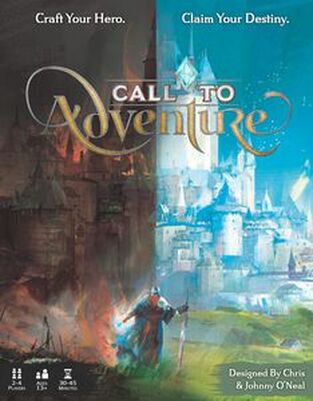 Full Disclosure: Brotherwise Games sent me a review copy of Call to Adventure. What is this game about? Call to Adventure is a game about creating a hero and helping them progress through an epic story, beginning with the hero's origin and culminating in an ultimate destiny. To build your hero, you begin with three cards—an origin, a motivation, and a destiny—then pick up character traits and complete challenges across three acts in order to "fill in" that character's story. Your hero may be more heroic or skew a little towards the dark side, with consequences in terms of what cards you're able to play based on your current ethical orientation. In a multiplayer game, the first person to complete Act III triggers the end of the game. In a solo game, players race an adversary who is trying to gain a certain number of experience tokens before their hero can fully take form. Call to Adventure is also a game about building up your dice pool. Instead of dice, however, the game features very fun two-sided "runes" that you can cast to complete challenges. Each card you gain will give you some sort of benefit in future challenges, and will make changes to the "pool" of runes that you can cast on your turn. You can also take a risk and cast "dark runes," which can provide enormous benefits in a challenge, but can also corrupt your hero. Although Call to Adventure is essentially about acquiring cards for your hero, it is not enough to just acquire a random assortment of trait and challenge cards. The ultimate winner of a multiplayer game will be the hero with the most points, and different cards will offer different rewards, including story points or interesting bonuses. In a solo game, a player must defeat the adversary on their last turn in order to win the game—so you'd better be looking for cards and configurations of runes that lend themselves to victory. 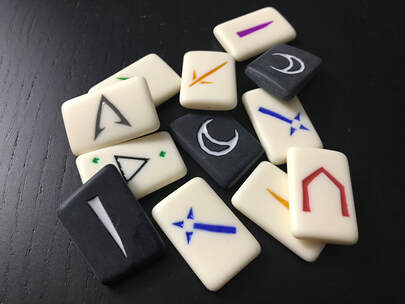 A lovely assortment of runes. A lovely assortment of runes. How does it play solo? Call to Adventure does have a solo/co-op mode in which players face off against an Adversary from the game. In this mode of play, you are essentially racing to acquire character cards and ultimately defeat the Adversary before the Adversary gains a certain number of experience points. The Adversary will also have turns during which it plays cards that interfere with players' attempts to complete challenges. Overall, though, the Adversary can't do too much to you—the main thing is figuring out how to build your pool of runes in a way that will help you achieve victory against the Adversary later. Overall Thoughts I really wanted to like Call to Adventure, and there are a lot of things to appreciate about it. The component quality in this game is excellent. I thoroughly enjoyed the card art, and casting the runes feels very satisfying. There's something a little extra exciting about those! The overall outline of a story that you can create for your character by the end of a game of Call to Adventure is also fun. While not required, it is recommended that players tell their heroes' stories at the end of the game, and I think that Call to Adventure could be a fun way to inspire new DnD characters or perhaps even short stories. It's fun to see an epic narrative distilled down to its bare bones, and future expansions of this game promise further excitement in this area—they will incorporate real story elements from the works of Patrick Rothfuss and Brandon Sanderson. I think a lot of fantasy fans will find this exciting. It's enough to keep me waiting to see if Call to Adventure continues to evolve as a game system. But in the end, Call to Adventure in its current form feels only partially baked, especially when it comes to solo mode. Although the Adversary has a deck of cards that can interfere with you, it never feels like Adversarial intervention is that big of a threat—and thus there is not that much tension in the game. You can definitely get unlucky if you fail too many challenges or if you are not revealing cards with the correct runes on them, but that feeling of slugging it out with an opponent isn't there. I'd really like to see meatier solo/co-op play, or I might as well just shuffle the cards and lay them out in interesting combinations to create homebrew fantasy narratives. (Which actually sounds like a fun idea...) 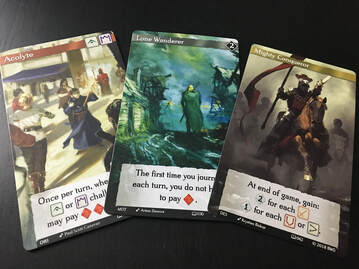 A potential origin, motivation, and destiny. A potential origin, motivation, and destiny. The rulebook for Call to Adventure has some issues, as well. Although this game is light as air, I found myself rereading several sections and hunting around for information that wasn't intuitively placed. It took me a moment to really understand how to complete challenges because the visual example provided was not crystal clear, and the solo/co-op rules could also use some clarification and perhaps an example of gameplay. In a game that is otherwise so well-produced, I found this particularly frustrating. Finally, as is often the issue I have in games that try to both be a game and help you create a fun story, Call to Adventure sometimes gets in its own way. The winner of the multiplayer game is the one who tells the "most interesting story," as determined by points earned throughout the game. But often, you find yourself picking the card that is worth more points instead of the card that actually tells a more interesting story. In solo, there is no score at all—just a drive to collect cards fast and beat a final challenge. Because failing even one challenge can really set you back, you'll find yourself inclined to go only for challenges that you're fairly certain you can win. Taking big risks is great fun in a story, but it can backfire in a board game, and that's a restriction I don't enjoy when going for my own version of "most exciting" epic narrative. Do I recommend it? In its current form, I do not recommend Call to Adventure. Some people will like it—it's light, it's relaxing, and if you're the imaginative type you can create some fun narratives with it. But as a game, I don't feel it's entirely there. I would at least wait to see if there are improvements made to gameplay when the next KS campaign rolls around. Overall Rating: 2.5 stars Rating scale: 5 stars — I love it! 4 stars — I really like it. 3 stars — I like it. 2 stars — It's okay. 1 star — Meh.
0 Comments
 This review has been updated as of 9/11/2019 to reflect my opinions about the Alexis Solo Mode. What is this game about? Welcome To... is a roll and write, or technically a flip and fill, in which you are planning out a 50s-style suburban neighborhood. The goal is to get as many points as possible, but there are a lot of ways to get there—will you try to build a lot of pools? Develop parks on every street? Build estates of a certain size to fulfill a high-scoring city plan? You've got all kinds of choices, and you'll be agonizing over which ones to make as the game goes on. During each round of Welcome To..., players look at three pairs of cards. In each pair, one card will show its side that displays a number, while the other will show the side that displays a bonus action. These can include pools, fences (for creating estates), and my very favorite, the "Bis" action. Bis allows you to copy any house number on the board to an adjacent empty space (i.e., you can add a 3b to an already-existing 3). But it comes with a price—you lose more points each time you do it! Each player must choose one pair of cards per turn, allowing them to place one number and to optionally take one bonus action. What makes this choice particularly agonizing, however, is that numbers need to be placed along streets just the way actual addresses are—in ascending order. Numbers go in order from 1 to 15, and each street has fewer than 15 houses on it... but are you sure you want to guess where you should put that 8 just to get another pool? Especially when there is a convenient 1 or 15 to put at the end of one of your streets, instead? You definitely don't want to restrict your number placement too much, especially early in the game—if you can't place a number on any of your houses, then you have to cross off a "permit denied" space. Get a second denial and you lose points. Get a third, and you'll lose even more points plus trigger the end of the game. (This is one of the reasons that Bis action can become so seductive...) How does it play solo? Welcome To... works very well solo, and actually has a slight variation for the solo mode. Instead of working with three pairs of cards at a time, you just draw three cards. You then take one card for its number, one card for its bonus action, and discard the third. This makes it easier for one player because there's a lot less upkeep. There's also a solo card that is shuffled in to let you know when the bonuses for completed city projects decrease in value (in the multiplayer game, the first person to complete a project gets more points than the next players who do so). Welcome to... also has a small solo expansion deck called the Alexis Solo Mode. This is where the game gets seriously interesting—with Alexis, instead of just playing against yourself to beat your high score, you can battle an increasingly brutal lineup of AI opponents. What is particularly brilliant about the Alexis Solo Mode is that upkeep is minimal and you still play in mostly the same way. However, the cards you discard become your solo opponent's "neighborhood," and each AI challenger gets different point amounts for different types of construction cards. Alexis can also score for city projects, so you'll really have to race for them. The Alexis Solo Mode actually adds a new layer to the game by forcing you to consider not only the cards you take for yourself, but the ones you don't. 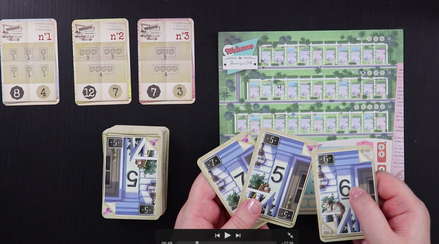 Decisions, decisions... Decisions, decisions... Overall Thoughts I enjoy the heck out of Welcome to... I am still not entirely convinced by the title of the game, but aside from that, I'm sold. I will happily play this game anytime, and frequently several times in a row. I've already made sure to laminate several player sheets so that I can use dry erase markers when my game pad starts to run low (which will be soon). What makes Welcome to... so darned good? It's the diabolical tension between going for the bonus action you want and the best street number for you. Sometimes the stars will align and you'll get the perfect pair. But most of the time, you'll have to make some nasty choices, and that is where all the fun is. What strategies will you commit to? How aggressive will you be about that city plan when you can build a bajillion parks instead? Will you sell your soul... to the seductive and convenient Bis? There are always a lot of decisions to make in Welcome to..., and they are all interesting. I also ended up really liking the 1950s aesthetic of the game, which gives it a cool vibe and makes it fun to play in groups. (Also fun in groups is the option to name your town whatever you want. At this point, I've seen it all...) I also appreciated the simple adjustments made to the solo mode in Welcome to... While it's a beat-your-own-score game and nothing is going to change that, I love that the solo mode makes upkeep easier for a lone player and that it builds in a timer to put pressure on you as you work to finish city projects. And beyond the in-box solo mode, the Alexis Solo Mode takes Welcome to... from really good to great. It's a rare thing to play a multiplayer game where the solo mode is not only excellent, but a straight-up improvement on the overall experience. The Alexis Solo Mode gives you just that extra bit more to think about, as well as scoring challenges that will push you further as a player than any other game mode. The fact that it manages to be both low-upkeep and diabolical makes Alexis Solo Mode the best $5 you could spend on a solo expansion, and I now consider it an essential part of my gameplay. My one nitpick about Welcome to... is that the rules are just abstract enough to make the game difficult to teach to new players, especially those who are new to gaming. There is a lot going on, and it takes some getting used to. Some bonus actions, such as the pool, have to be tied to the number paired with it on your turn. Others, like the fence, can be put anywhere in your neighborhood, regardless of where you put the number that came with it. It's not very intuitive, and while that does not bother me at all as a solo player, get ready for the occasional rough teach on game night. Do I recommend it? Absolutely. If you have any interest in roll and write games at all, then you should try Welcome to... In my opinion, it's among the best roll and writes board gaming has to offer. With Alexis Solo Mode, I think it's the best roll and write I have had the pleasure to play. Overall Rating: 5 stars 5 stars — I love it! 4 stars — I really like it. 3 stars — I like it. 2 stars — It's okay. 1 star — Meh.  So far, Raz has interviewed Athena Ex and Dejun King. I'm once again taking a risk and handing the mic to Albin/Crazed Survivor/Razoupaf, a dedicated solo gamer and BGG aficionado who knows his way around solo games and the people who play them. You can find more of Raz himself at his site, Le Comboteur Fou. This week, I'm publishing his interview with Farydia, who is famous for epic Aeon's End marathons! Off we go... It should be common knowledge now that I'm an avid Aeon's End player. Therefore, when Farydia came with a fantastic idea for a solo, single-handed marathon through all the contents of my favorite wave to date, i.e. wave 1 (Aeon's End, The Depths, The Nameless), I could but join. I played my part in recommending that she turn the thread into a Geeklist, and then I was blown away by the quality of the content. There was flavor text. There was push-your-luck. There were side-quests. There were rewards. And most of all, there was fun. I managed to win the marathon with fellow humongous fan and playtester user Ruduen, piloting the very strong, borderline overpowered Z'Hana (and making my fair share of mistakes along the way). And so I was overjoyed when Farydia came back with the War Eternal marathon, with thrice the fun and thrice the ways to play (and thrice the dead prophets too!) Since I'm a coward, I brought to battle the ever-broken Gex, and am having as much fun, if not more, than in the first marathon, and recommending it to everyone, borderline spamming into the New Age Kickstarter campaign to be honest. Simply put? I think the marathon is miles ahead of the official campaign variant the Aeon's End designer, Kevin Riley, has come up with. But since it's not as flexible in terms of who you face, the good news, is that both can co-exist. 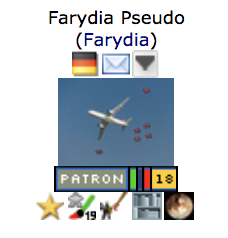 Raz - Farydia, I have selected you for your Aeon's End marathons. Can you tell us a little more about you? Farydia - Sure thing! I'm in my mid-thirties and work as an engineer in the aerospace industry. And even after more than ten years, I still love my job (with the normal ups and downs, sure), it's never boring, even though there's currently no big aircraft program in development, there's always something to do on the ones already flying. Current tragedies notwithstanding. So you might say that rules are a big part of what I do each day, even outside of boardgaming. It's a bit difficult to tell apart cause and effect here, but I'm just gonna assume that a certain affinity to problem solving and optimizing what you can do in a tightly defined ruleset both affected my choice of profession as well as my enjoyment of boardgames (and video games, too). I've been a gamer as long as I can think. I also enjoy painting miniatures (for boardgames), although I'm practically talent-free. It's become a great way to relax for me and it's fun and that's my main objective there. And thirdly, I've been an avid reader of books for just about all my life (well, minus the first 5 years, when I wasn't yet able to read, of course). I'm unmarried, but live in a happy relationship. And the best thing is that my partner also likes to play boardgames, so we can enjoy this great hobby together. He's the best kiss. R - You have put a lot of work into each entry of the marathon, which are complete with their story text, a full market, a set of rewards for the next game, and even a Nemesis-specific reward. What inspired you to do this, and how do you work each entry out? F - I mostly (but not exclusively) play solo games when I'm on business trips. But I'm probably not a "pure" solo gamer at heart. I like gaming to be a shared activity among many people. So I thought of a way of doing solo games together (kind of), by having other people on BGG contribute to the defense of the city of Gravehold together with me. My personal affinity to reading and stories made it easy to get into the lore of Aeon's End a bit and I enjoy writing these tiny tidbits of flavour text to set the mood for the current chapter of the Marathon. Beats writing requirements all day for sure . Another factor is, that in order to have a shared experience, while not sitting at the same table together, it is necessary to have some common elements that everyone actually shares. So this is how the set market and the rewards came into the mix. As for the reward and market setup and design: The market I build with the randomizers, but I draw more cards than will be needed and then select cards that allow a sensible build for the round. I deliberately also leave in cards that I consider inferior, because I've seen some interesting uses and strategies I hadn't thought of before. The reward tiers, I considered them necessary to offset a bit of the difficulty. As you will often not start the round with full health and that would quickly become a death spiral, especially as the Nemesis are getting successively harder. I usually design the rewards according to the rule that one will give Aether at the start of the game to allow a head start, one will provide some healing opportunities and one reward usually manipulates the game state in another, more freestyle way, by allowing to deal additional damage or shield or in general use abilities you otherwise do not have. All of these effects are usually one-shots, we wouldn't want the game to easy, would we? And finally the Nemesis rewards. I have to admit, I mostly go with my gut here. I put more focus on them feeling thematic than really balancing them out. I know, their difficulty is wildly swingy, some are quite easy to obtain while others are pretty hard to pull off. The rewards I also try to tie to the Nemesis and that is my main guideline here. They often reward winning after things went really badly or reward risk taking during the game. So that is another thing I keep in mind when setting them up. I often chicken out halfway through the game when I pursue them myself ninja. R - What was the greatest challenge you faced in crafting these marathons? F - Hm, probably setting it up for the first time. I put a lot of time into laying down the rules in a hopefully concise way, but at the same time I didn't want to frighten people off with a wall of text. Also organizing it in the geeklist is a bit fiddly. I changed the system for the second marathon a bit, but I'm still not entirely happy with how that works. I have a spreadsheet to keep up with everything, but sifting through the entries to compile the info is still fiddly. R - Are you working on or do you intend to work on other games in a similar fashion? F - I've thought about it, but right now there is no other game that I enjoy enough solo to put a comparable amount of work into. I'm not ruling it out, but I'm not actively working on anything right now, no. R - I noticed you mentioned working on something for Aeon's End: Legacy. Can you tell me more? F - We haven't played the campaign, yet, so it's all pretty vague. But it certainly would involve the individual mages created during the Legacy campaign. I think that would be cool to have this army of unique mages to defend the City. But I wouldn't want to miss all the characters from the other games, like Garu, Brama, Sparrow, etc., so I was thinking about doing some kind of "mentor" or "sidekick" thing with them. The story would be a stronger element in a Legacy Marathon for sure. From what I've read, though, the Nemesis don't really work outside the campaign, so I would use the base game / WE Nemesis. Not all of them, that would be humongous, but probably 5 or 6. And I was thinking, to get into the Legacy spirit, that there would be more lasting effects to the game state over the Marathon. Right now, each round only has repercussions on the next round. There would certainly be elements that introduce lasting changes, but for everybody. This is different from the rewards, which are individual boosts. One thing that floats around my head for this is have an "overall" health pool for Gravehold that is gradually depleted. Yeah, sorry, it's still all pretty vague, but that's a little glimpse into what I currently have in my mind for that. Subject to change, of course . 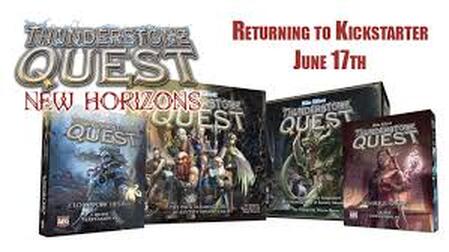 It's been a while since I've done one of these. But I'm back in the saddle, and ready to see what I see! 1. Thunderstone Quest: New Horizons After the recent delivery of the To the Barricades! pledges, AEG is back with another Thunderstone Quest expansion. Get ready for some new quests! I do, however, plan to exercise some caution with this one. Why? Because I haven't had time to play To the Barricades! yet, and I have no idea whether I want to keep investing in this series. Not gonna lie, I feel a little bit rushed. So while I love deck builders, and I'm interested in the scope of this game world, I am not ready to commit more until I've had a chance to seriously enjoy the previous installments. 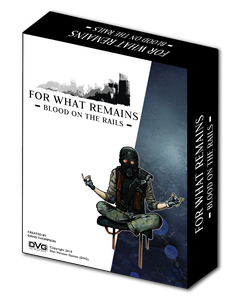 2. For What Remains Regular readers will know that I'm quite the fan of David Thompson's Pavlov's House. His current game from DVG, For What Remains, is currently on Kickstarter. For What Remains is a post-apocalyptic skirmish game for 1–2 players, that comes in three separate installments. You can either follow the story through all three boxes, or choose one . that interests you most. Either way, expect plenty of replayability. 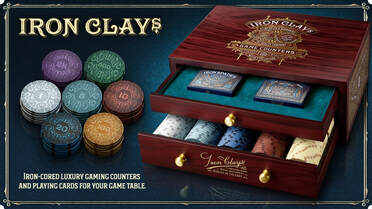 3. Iron Clays & Spades This isn't a game—just luxury components for all of your games! Iron clays are some pretty sexy poker chips. If you've played the reprint of Brass, then you've probably encountered them. They're definitely a splurge and not a necessary addition to your gameplay, but my goodness they are pretty! I've been thinking about getting some nice coins or other components to use with multiple games, and I think these might be it. You can also get some really nice playing cards, which are useful for a number of purposes.  After his awesome conversation with Athena Ex, I'm once again handing the mic to Albin/Crazed Survivor/Razoupaf, a dedicated solo gamer and BGG aficionado who knows his way around solo games and the people who play them. You can find more of Raz himself at his site, Le Comboteur Fou. This week, I'm publishing his interview with Dejun King, another underappreciated 1PG hero. Take it away, Raz...  Dejun is someone whose generosity has always impressed me. Be it from trading a copy of Coffee Roaster, new, in shrink to send to me just because — something which I'm still yet to repay — or from sending some of his games to new members of the guild, the guy just likes giving and sharing. He's also responsible for a couple solitaire variants to games he loves, notably Honshū. He won't hesitate to start designing a variant if you start asking him to. And he will pause playtesting his million undergoing designs to do so. Admit it, you've already fallen under Dejun's spell! So far, Dejun has done variants for Villages of Valeria, Honshū, Hokkaido, Goodbye, Ghosts!, The Oracle of Delphi and Arboretum. While he's a little less present nowadays for reasons of his own, Dejun has left a strong impression on many a Guild member, who are avidly awaiting his return. Raz - Dejun, I have selected you for your generosity towards new guild members, and for the solitaire variants you have designed. Can you tell us a little more about you? Dejun - Raz! How's it going my friend, nice to be speaking with you again. Fair warning, since this is an internet-based interview I fully intend on making myself sound way more exciting than I actually am for the listeners, is that ok? R - I'm totally fine with that and the mic is on. Lemme... Okay... Dafuq is wrong with this record... *Scratch scratch* okay the beat is on moffo, you can start, make it good! D - Awesome! Well where to start... I am a 32 year old engineer from Missouri (astrological sign- Cancer, in case we have any fans out there) whose hobbies include not all but most of the following: Gaming, Music, Art, Eating, Long Car Rides, Adult Beverages, Tree Hugging, Maple Syrup Making, Gordon Ramsey Binging, Heavy Book Lifting, Flowers, Nature, Quilt Collecting, People Watching, Fire Juggling, Dancing, Antiquing, and Metal Detecting. CONTEST ALERT: The first person to tell me the 6 falsified hobbies I listed of mine will receive a free game, compliments of myself. R - Can I play too? D - Dude we talked before this, you are getting the interview, isn't that enough... stop de-railing this thing... sheepsheepsheepWWWWWsheep [Editor's Note: Am mildly concerned, but determined to leave this interview as submitted.] Moving on, I have a lovely family which consists of myself, my beautiful wife of of 7 years, Taylor, my smarter-than-he-should-be 6-year-old son ,Apollo, and our super-lazy dog, Tuna. I really enjoy meeting new people and am guilty of starting conversations through PMs on the Geek that end up lasting months... those poor souls who feel it's rude to not reply to my messages, I feel sorry for them. Raz, I am sure you know me better than I know myself by now, did I leave anything out? R - The freaky parts but those are best kept to ourselves, if you ask me. D - Right... there are the rails... lets stay on track. R - Can you tell me more about your variants? How do you pick a game to do a variant for and how do you design the rules ? D - For me the games I choose to make variants for are the ones that I love to play during game nights but are impossible to play any other time. In order to get my fill of these games I must take it upon myself to either try and find a solo variant on the Geek that fits my personal play style or create something I would enjoy. As for designing, I always enjoy an objective or competitive driven solitaire game rather than the stand by "Beat your best score". In multiplayer games I am striving to play better than my opponent to win, so this is what I try and re-create in my variants, even though my opponent is a fictitious robot with no face for which to rub in a victory. Before I start a variant I really try to understand how the game works as a multiplayer game. From there I try figuring out what I can do to mimic "Player Only" decisions and make them as streamlined as I can. Sometimes it works great and the game is very enjoyable, and other times it all falls apart and you feel like you are doing tedious work rather than enjoying a board game, and this is where playtesting a variant over and over and over (I will skip the next 100 "over's" for the listener's sake) really becomes a crucial part you must not ignore. Could I also just take a minute to-- R - I don't think we have time for that... D - —thank each and every person-- R - Dejun I have a schedule to-- D - —who has helped me with any form of feedback and playtesting-- R - No seriously dude I really mean it! D - —for my games and variants over the years. R - Oh boy I'm so fired! D - You have all made a huge difference and I appreciate each and every one of you for your help. R - You mention all of your designs, be it solitaire variants, or actual new games, are ongoing. You've released your variants and have sent game rules to your friend, but you're never satisfied. What would it take for you to consider a ruleset to be finished and ready for publication? D - I do not think that the design is the issue in your question but rather the creator. I have been this way all my life. I have drawn pictures that I have never hung up for display. I have written songs that only a handful of people have heard. This type of compulsion to never finalize something because I think I can keep making it better leaks through to my solo variants as well. Even though I design simple games/variants that receive positive feedback, I still am always hesitant to commit and say that a product is finished. R - You love trading. You are not trying to make a profit in it, and you love meeting back people you've traded with to play a game with them. What's your best trading memory? D - You absolutely right Raz, I am a trader through and through. I often do mildly lopsided trades benefiting the other person for two reasons: 1.) The games I trade no longer get played as they should and I know they are going to someone who will give them the attention they deserve. 2.) When you feel like you are getting a deal you can't help but smile and be happy and I love to make people happy. As for my most memorable trade story, it would have to be when I traded Terraforming Mars to Derek (Donutz McGoo). I was no longer playing TM like I once was when I first picked it up, and he had expressed interest in a number of games I had so I thought it would make for a good trade opportunity. After discussing the trade we met up and I said goodbye to my games as did he to his and we parted ways. A couple weeks go by and I saw Derek post an entry to SGOYT (ndlr: the Solitaire Games On Your Table monthly geeklists, for which you can subscribe here) for Terraforming Mars and I was pleased to see that my game was getting to the table an being enjoyed. A few more weeks go by and Derek's entries of Terraforming Mars continue to increase especially after adding the expansion Prelude. The more entries I read of Derek's, the more I found myself saying, "Man, he is making this game look great...... is he selling me on my own game!?" Long story short, it didn't take long until I was back at the game store making a purchase for something a few months earlier I was glad to get rid of. I still laugh about this today. R - You've fallen deep into the Keyforge trap, and although I know you enjoy crushing your opponent and then digging their grave with their own corpses, I'm surprised you still haven't figured a solo variant for the game. I guess my next question is: when can we expect such a variant? D - Oh man we get to talk about Keyforge!!! Ok, super pumped about this... so there is no solo variant on the horizon although I did try and contact Richard Garfield and FFG to ask if there would ever be an introduction of "Training Decks". House-specific products you could purchase that you could pit your decks against at your leisure (something along the lines of what Magic: The Gathering did around the Theros block (nldr: Magic: the Gathering had soloable challenge decks during the Theros block which never really took off but were a much welcome addition for players who couldn't regularly meet opponents, or simply wanted a lighthearted cooperative variant. There were 3 of them, one against an hydra, one against a minotaur horde, and against Xenagos after he ascended to godhood). Each deck would deliver road blocks that house is capable of playing in a PvP game and it is up to you to forge 3 keys before the training deck can. Although a solo variant is not in the works from me, I am very pleased with the progress I am making for the "Big Deck" variant I am in the process of creating. I love, love, love this game and am so pleased the I have finally found for myself a good alternative to MTG. R - You definitely have to let us know if you start co-designing with Richard Garfield! D - HA! you know that will never happen... Wait, did I hear sarcasm in that comment? Was that meant as a stab towards me.. You know what.. we're done here.. GET THIS THING OUTTA MY FACE! R - Erm. Moving on. 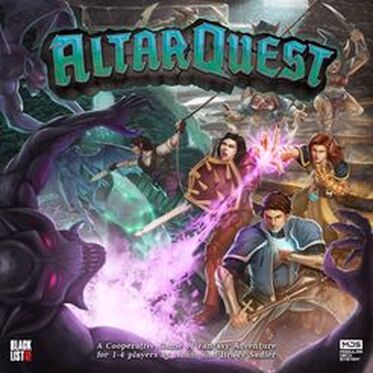 Full Disclosure: A demo kit of Altar Quest was sent to me by Blacklist Games so I could make this preview. To see the Kickstarter campaign for Altar Quest, click here. What is Altar Quest about? Altar Quest is a game published by Blacklist Games and designed by Adam and Brady Sadler. It's the next entry in a series that uses the Sadlers' modular deck system, but unlike Street Masters and Brook City, it has a fantasy theme. In Altar Quest, you'll be playing heroes who each have their own decks. You'll also be going up against challenges managed by quest, threat, and enemy decks that combine to form highly thematic, story-driven adventures. Mechanically, Altar Quest has a bit more bookkeeping than its predecessors, but it also has several elements that make it more interesting to play. Like other Sadler games, die rolls on various skill tests are never entirely useless, even if they don't work out the way you want them to. In Altar Quest, "focus" results don't immediately count as successes, but get you tokens you can use for later—either to meet card requirements or to convert later die rolls into successes. On top of the dice that characters use for tests, there are altar dice that display "rhune" symbols—symbols that both you and your enemies can manipulate and deploy to power up your card actions. The hero cards themselves also do more than help you fight better—many of them can be used cleverly to affect both test and rhune dice. Although the demo kit I received has only two heroes in it, the synergy between heroes is interesting so far. It's also entirely possible to solo the game with a single hero—something that matters to a lot of solo players. Things I like about Altar Quest So far, Altar Quest is delightful. The components are amazing, even in prototype form (especially the miniatures), and the gameplay itself is showing a lot of promise. The quest and enemy decks work well together to give you a goal to pursue as well as pressure to work towards it quickly. Your opponents will pack quite a punch, but if the demo quest is anything to go by, they are manageable. Depending on how the final game turns out, I might like this one even better than I like Street Masters, and that's saying something. I particularly liked the added element of altar dice, which gave me something new to work with when trying to reach my in-game goals. It's also extremely clear, even from only samples of game text, that the Sadlers have put tremendous effort into building the world of Altar Quest. When you play, you enter a fully realized fantasy world with much left to discover, and I'm here for it. Possible Concerns about Altar Quest The Sadler brothers' modular deck system has an incredible capacity for in-game storytelling. It also, however, comes with some pretty serious bookkeeping, especially when you are first learning a game like Altar Quest. Before long, the game flow will make sense, but there are still a lot of cards to keep track of. And because multiple cards have different pieces of text on them, it's entirely possible that you'll overlook the occasional activation or card option. If that frustrates you, consider this one carefully. In my opinion, however, keeping track of all those cards is worth the effort--Altar Quest shines if you love thematic games that allow you to fully experience and imagine an in-game adventure. Should I back it? I personally want this game and am excited to play more of it. If you love fantasy and story-driven games, you will probably love Altar Quest. This is even more the case if you have fond memories of playing HeroQuest, because this game is giving off all of those nostalgic vibes. If you love Street Masters, then Altar Quest is also going to be a good match for you—especially if you prefer fantasy themes. I would think twice, however, if you hate a lot of in-game bookkeeping. Altar Quest makes sense and it's entirely possible to manage it, even by yourself—but if that isn't your thing, this game is unlikely to change your mind. Playthrough: |
AuthorMy name is Liz Davidson, and I play solo board games. A lot of solo board games... Archives
August 2021
Categories
All
|
 RSS Feed
RSS Feed